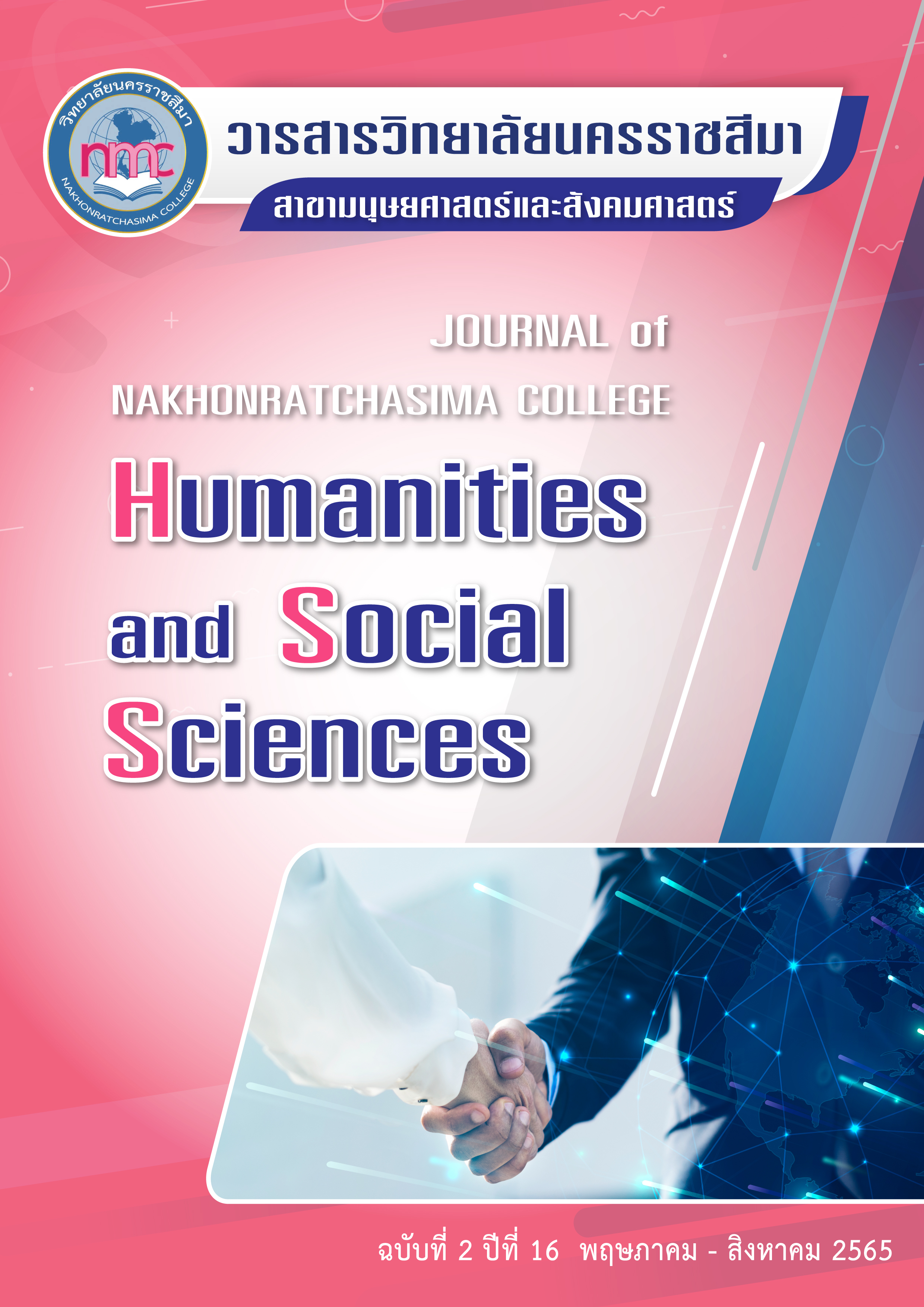ผลการจัดประสบการณ์เรียนรู้โดยใช้นิทานเพื่อพัฒนาทักษะสมอง (EF) ของเด็กปฐมวัย
The Results of Experience Management Using Tales to Promote the EF (Executive Functions) Skills of Preschool Students
คำสำคัญ:
การจัดประสบการณ์เรียนรู้โดยใช้นิทาน, ทักษะสมอง, แผนการจัดประสบการเรียนรู้บทคัดย่อ
การวิจัยครั้งนี้มีวัตถุประสงค์เพื่อ (1) เพื่อพัฒนาแผนการจัดประสบการณ์เรียนรู้โดยใช้นิทานเพื่อพัฒนาทักษะสมอง (EF) ของเด็กปฐมวัยให้มีประสิทธิภาพตามเกณฑ์ 80/80 (2) เพื่อเปรียบเทียบพัฒนาการทักษะสมอง (EF) ก่อนและหลังการจัดประสบการณ์เรียนรู้โดยใช้นิทานของเด็กปฐมวัยกลุ่มตัวอย่างของงานวิจัยนี้ได้แก่ เด็กปฐมวัยโรงเรียนบ้านโกรกกุลา เครือข่ายตาเนินกะฮาด ตำบลตาเนิน อำเภอเนินสง่า จังหวัดชัยภูมิ สังกัดสำนักงานเขตพื้นที่การศึกษาประถมศึกษาชัยภูมิ เขต 3 ภาคเรียนที่ 2 ปีการศึกษา 2564 เด็กปฐมวัยจำนวน 18 คน จำนวน 1 ห้อง ได้มาจากวิธีการสุ่มแบบกลุ่ม โดยใช้ห้องเรียนเป็นหน่วยสุ่ม เครื่องมือในการวิจัยครั้งนี้ได้แก่ 1) แผนการจัดประสบการณ์เรียนรู้โดยใช้นิทาน เพื่อพัฒนาทักษะสมอง (EF) ของเด็กปฐมวัย จำนวน 25 แผน รวม 25 ชั่วโมง (กิจกรรมเคลื่อนไหวและจังหวะ, กิจกรรมเสริมประสบการณ์) มีค่าความเหมาะสมระดับมาก 2) แบบประเมินพัฒนาการทักษะสมอง (EF) ก่อนการจัดประสบการณ์ ระหว่างการจัดประสบการณ์ และหลังการจัดประสบการณ์เรียนรู้โดยใช้นิทาน เป็นแบบสังเกตพัฒนาการทักษะสมอง (EF) จำนวน 15 ข้อ วิเคราะห์ข้อมูลโดยใช้ ค่าร้อยละ ค่าเฉลี่ย ค่าส่วนเบี่ยงเบนมาตรฐาน สถิติที่ใช้ในการวิเคราะห์ข้อมูลคือ การทดสอบที
ผลการศึกษาพบว่า
1. ผลการจัดประสบการณ์ตามแผนการจัดประสบการณ์เรียนรู้โดยใช้นิทาน เพื่อพัฒนาทักษะสมอง (EF) ของเด็กปฐมวัย มีประสิทธิภาพตามเกณฑ์กำหนด 51/82.22
2. ทักษะสมอง (EF) ของเด็กปฐมวัยหลังการจัดประสบการณ์สูงกว่าก่อนการจัดประสบการณ์อย่างมีนัยสำคัญทางสถิติที่ระดับ .05
เอกสารอ้างอิง
กระทรวงศึกษาธิการ. (2560). หลักสูตรการศึกษาปฐมวัย สำหรับเด็กอายุ ๓ - ๖ ปี. กรุงเทพฯ. สำนักวิชาการและมาตรฐานการศึกษาสำนักงานคณะกรรมการการศึกษาขั้นพื้นฐานกระทรวงศึกษาธิการ.
ขวัญนุช บุญยูฮง. (2546). การส่งเสริมทักษะพื้นฐานทางคณิตศาสตร์ของเด็กปฐมวัยโดยการเล่า “นิทานคณิต”. ปริญญานิพนธ์ กศ.ม. (การศึกษาปฐมวัย). กรุงเทพฯ: บัณฑิตวิทยาลัย มหาวิทยาลัยศรีนครินทรวิโรฒ. ถ่ายเอกสาร.
ขวัญฟ้า รังสิยานนท์, อัญชิษฐา ปิยะจิตติ และรัถยา เชื้อกลาง. (2560). การจัดประสบการณ์การ เรียนรู้. คณะครุศาสตร์ มหาวิทยาลัยสวนดุสิต: กรุงเทพมหานคร
คันธรส ภาผล. (2563). ผลการจัดกิจกรรมนิทานหุ่นเงาที่ส่งผลต่อส่งเสริมการคิดเชิงบริหารสมองสำหรับเด็กปฐมวัย. วารสารครุศาสตร์สารมหาวิทยาลัยราชภัฏบ้านสมเด็จเจ้าพระยา. 14(1): 100-113; มกราคม-มิถุนายน. 2563.
จินดา หีบเพ็ชร. (2558). ผลการจัดกิจกรรมการเล่านิทานประกอบสถานการณ์จำลองที่มีต่อความ รับผิดชอบของเด็กปฐมวัยโรงเรียนวัดเขาขุนพนมจังหวัดนครศรีธรรมราช. วารสารศึกษาศาสตร์ มหาวิทยาลัยทักษิณ. 17(2): 131-139; กรกฎาคม. 2560.
จิระพร ชะโน. (2562). การคิดเชิงบริหารกับการพัฒนาเด็กปฐมวัย. วารสารศึกษาศาสตร์มหาวิทยาลัยมหาสารคาม. 13(1): 7-17; มกราคม-มีนาคม. 2562.
ชัยยงค์ พรหมวงศ์. (2536). การทดสอบประสิทธิภาพชุดการสอน ในเอกสารการสอนชุดวิชาสื่อ การสอนระดับประถมศึกษา หน่วยที่ 8-15 (พิมพ์ครั้งที่ 12). นนทบุรี: ฝ่ายการพิมพ์ มหาวิทยาลัย สุโขทัยธรรมาธิราช.
บุญชมศรี สะอาด. (2545). การวิจัยเบื้องต้น. พิมพ์ครั้งที่ 7. กรุงเทพฯ: สุวีริยาสาส์น.
นวลจันทร์ จุฑาภัคดีกุล. (2559). การพัฒนาทักษะสมอง EF สำหรับการเรียนรู้ ในศตวรรษที่ 21. การประชุมทางวิชาการของคุรุสภา ประจำปี 2559 “การวิจัยนวัตกรรมการเรียนรู้และการจัดการศึกษาเพื่อการพัฒนาที่ยั่งยืน”. สำนักงานเลขาธิการคุรุสภา.
เบญจวรรณ กี่สุขพันธ์. (2547). สื่อประกอบการเล่านิทาน. กรุงเทพฯ: บุ๊คพอยท์.
ประเสริฐ ผลิตผลการพิมพ์. (2561). เลี้ยงลูกอย่างไรให้ได้ EF. กรุงเทพมหานคร: สำนักพิมพ์ แพรง เพื่อนเด็ก.
พระราชบัญญัติการพัฒนาเด็กปฐมวัย. (2562). การพัฒนาเด็กปฐมวัย. ราชกิจจานุเบกษา ตอนที่ 56 ก. 136: 5-16; 30 เมษายน 2562.
วรรษิษฐา อัครธนยงมนต์และคณะ. (2563). ผลการจัดประสบการณ์การเล่านิทานประกอบหนังสือเล่มใหญ่เพื่อส่งเสริมพัฒนาการทางภาษาของเด็กปฐมวัย ชั้นอนุบาลปีที่ 2. วารสาร มจร อุบลปริทรรศน์. 6(2): 169; พฤษภาคม-สิงหาคม. 2564.
สินีนาฎ แสงแพง และปัทมาวดี เล่ห์มงคล. (2563). ผลของการจัดกิจกรรมการเล่านิทานประกอบ บทบาทสมมติ เพื่อส่งเสริมความเป็นพลเมืองในเด็กปฐมวัย. วารสารจันทรเกษมสาร. 26(1): 117-130; มกราคม-มิถุนายน. 2563.
สุภาวดี หาญเมธี. (2559). พัฒนาทักษะสมอง EF ด้านการอ่าน. กรุงเทพฯ : บริษัท ไอดีออล ดิจิตอลพริ้นท์จํากัด.
สมนึก ภัททิยธนี. (2551). การวัดผลการศึกษา. พิมพ์ครั้งที่ 6. กาฬสินธุ์: ประสานการพิมพ์.
สำนักงานกองทุนสนับสนุนการสร้างเสริมสุขภาพและสถาบันอาร์แอลจี. (2561). คู่มือพัฒนาทักษะสมอง EF Executive Functions สำหรับครูปฐมวัย. กรุงเทพมหานคร: สถาบันอาร์แอลจี.
สำนักงานคณะกรรมการพัฒนาการเศรษฐกิจและสังคมแห่งชาติ. (2559). แผนพัฒนาเศรษฐกิจและสังคมแห่งชาติ ฉบับที่สิบสอง พ.ศ. 2560 -2564. กรุงเทพฯ : สำนักงานคณะกรรมการพัฒนาการเศรษฐกิจและสังคมแห่งชาติ.
Hanmethi, S. (2016). Phattanathaksa samong EF duai kan an [Develop Executive Funtions by reading]. Bangkok: Ideol Digital Print.
Greenberg, M. T. (2006). Promoting resilience in children and youth: Preventive interventions and their interface with neuroscience. Annals of the New York Academy of Sciences, 1094(1), 139-150.
ดาวน์โหลด
เผยแพร่แล้ว
รูปแบบการอ้างอิง
ฉบับ
ประเภทบทความ
สัญญาอนุญาต
จรรยาบรรณผู้เขียนบทความ
ผู้เขียนบทความต้องรับรองว่าบทความนี้ไม่เคยตีพิมพ์ในวารสารใดหรือสิ่งพิมพ์อื่นๆ มาก่อน ต้องไม่คัดลอกผลงานผู้อื่นมาปรับแต่งเป็นบทความของตน และไม่ได้อยู่ระหว่างการเสนอเพื่อพิจารณาตีพิมพ์ อีกทั้งยอมรับหลักเกณฑ์การพิจารณาและการตรวจแก้ไขบทความต้นฉบับโดยกองบรรณาธิการวารสารวิทยาลัยนครราชสีมา สาขามนุษยศาสตร์และสังคมศาสตร์
บทความทุกเรื่องได้รับการตรวจพิจารณาทางวิชาการโดยผู้ทรงคุณวุฒิที่มีประสบการณ์และมีความเชี่ยวชาญตรงตามสาขาของบทความ ซึ่งผู้เขียนต้องแก้ไขตามคำแนะนำของผู้ทรงคุณวุฒิภายในระยะเวลาที่กำหนด หากไม่เป็นไปตามกำหนดกองบรรณาธิการขอสงวนสิทธิ์และยกเลิกการตีพิมพ์โดยจะแจ้งให้ทราบต่อไป
ข้อความที่ปรากฏในบทความของวารสารนี้เป็นความคิดเห็นของผู้เขียนซึ่งไม่เกี่ยวข้องกับวิทยาลัยนครราชสีมาแต่อย่างใด และกองบรรณาธิการขอสงวนสิทธิ์ในการพิจารณาและตรวจประเมินบทความเพื่อตีพิมพ์ในวารสารของวิทยาลัยนครราชสีมา สาขามนุษยศาสตร์และสังคมศาสตร์



